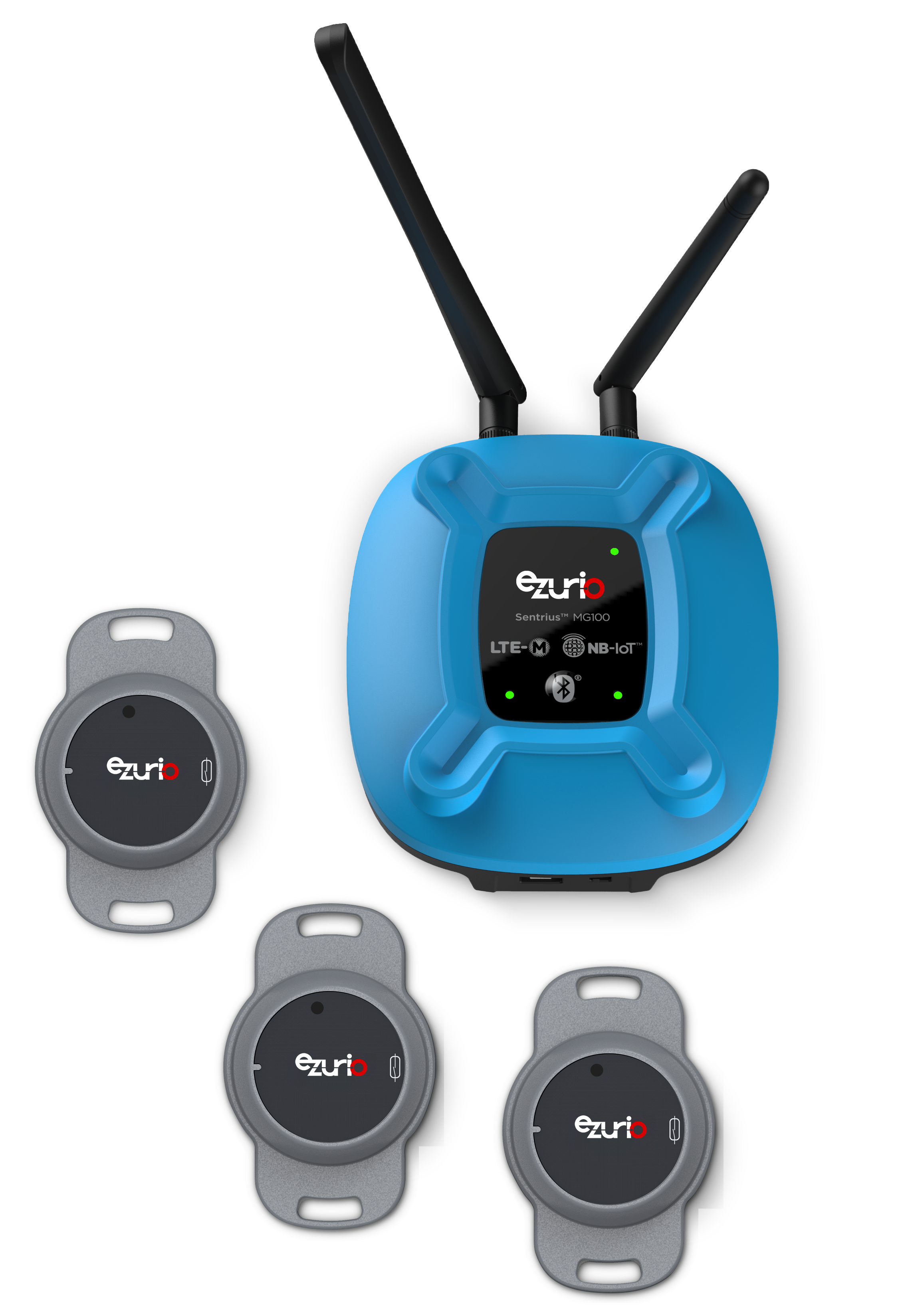Sentrius MG100 + BT510 Starter Kit
End of Life (EOL)

Overview
EOL Notice: The MG100 + BT510 IoT Starter Kit is EOL as of Nov 18, 2022. See our EOL Notice for more details.
Ezurio's Sentrius™ MG100 + BT510 IoT Starter Kit contains everything you need to start sending Bluetooth 5 Sensor data over LTE to the cloud! It contains the following:
- 1x Sentrius MG100 Wireless IoT Gateway with global power supplies
- 3x Sentrius BT510 – Long-range Bluetooth 5 temperature, motion, and open door sensor
- Ezurio’s free AWS-based IoT monitoring platform
- Sentrius IG Connect - iOS and Android mobile app for fast, in-field provisioning
- Global AC and DC power adapters
Use cases include cold chain transportation monitoring, predictive maintenance, and industrial IoT.
Buy Now
Specifications
Antenna Options
2x external antennas
Battery
2600 mAh standard capacity Lithium Ion 18650
Bluetooth Version
5
Cellular Carrier
AT&T
Verizon
Vodafone
Verizon
Vodafone
Certifications
FCC, ISED, CE
Input Voltage
2.2 - 5.5 V
Interfaces - General
USB 2.0 Host
MicroSD slot (SDHC, SD Card 2.0)
NFC
MicroSD slot (SDHC, SD Card 2.0)
NFC
LTE Category
LTE-M/NB-IoT
Memory
1 MB onboard flash
SD card support
SD card support
Wireless Specification
LTE-M
NB-IoT
Bluetooth 5
NFC
NB-IoT
Bluetooth 5
NFC
| Part Number | Price @ 1k | Additional Description |
|---|---|---|
| N/A | MG100 + BT510 Bluetooth 5 Starter Kit - 1x MG100 Gateway and 3x BT510 Sensors |
Documentation
Featured 1 total
Name |
Part |
Last Updated |
|---|---|---|
| Application Note - MG100 IP6x COTS Housing Recommendation | All | 03/18/2025 |
Application Note 1 total
Name |
Part |
Last Updated |
|---|---|---|
| Application Note - MG100 IP6x COTS Housing Recommendation | All | 03/18/2025 |
Product Brief 2 total
Name |
Part |
Last Updated |
|---|---|---|
| Product Brief - BT510 | All | 09/09/2024 |
| Product Brief - MG100 Gateway | All | 03/18/2025 |
Documentation 1 total
Name |
Part |
Last Updated |
|---|---|---|
| EOL Notice - IoT Starter Kits - Nov 2022 | All | 11/23/2022 |
Legacy Material 2 total
Name |
Part |
Last Updated |
|---|---|---|
| Getting Started with AWS IoT Core - MG100 | All | 12/16/2022 |
| PCN 8O-2021 - MG100 / Pinnacle 100 / MG100-BT510 Starter Kit | All | 12/16/2022 |
Become an Ezurio Customer to Gain Exclusive Access to Our Design Experts
- Antenna Scans
- Antenna selection and placement
- Custom antenna design
- Worldwide EMC testing / certifications
- Embedded RF hardware / firmware design
- Cloud architecture and integration
- Mobile application development
- Product & Industrial Design
Distributors
| Distributor | Phone Number | Region | Website |
|---|---|---|---|
| Arrow Electronics | 1-855-326-4757 +44 2039 365486 |
APAC, North America, South America, EMEA | Website |
| Avnet | 1-480-643-2000 +44 1628 512900 |
APAC, North America, South America, EMEA | Website |
| Braemac Australia, New Zealand, South East Asia | +61 2 9550 6600 +64 9 477 2148 |
APAC | Website |
| Cal-Chip Connect | 1-215-942-8900 |
North America | Website |
| DigiKey | 1-800-344-4539 |
North America, South America, APAC, EMEA | Website |
| EBV Elektronik | EMEA | Website | |
| Farlink Technology China, Hong Kong | +86 13266922199 |
APAC | Website |
| Farnell | 1-800-936-198 +44 3447 11 11 22 |
EMEA | Website |
| Future Electronics | 1-800-675-1619 1-514-428-8470 |
North America, South America, APAC, EMEA | Website |
| Glyn | +49-6126-590-0 |
EMEA | Website |
| Hy-Line Germany Only | +49 89 614 503 0 |
EMEA | Website |
| Jetronic China, Hong Kong and Taiwan | 852-27636806 |
APAC | Website |
| Laird Connectivity | 1-847-839-6925 +44 1628 858941 |
North America, South America, APAC, EMEA | Website |
| M2M Germany | +49-6081-587386-0 |
EMEA | Website |
| Martinsson | +46 8 7440300 |
EMEA | Website |
| McCoy South East Asia | +65 6515 2988 |
APAC | Website |
| Mouser | 1-800-346-6873 +44 1494 427500 |
North America, South America, APAC, EMEA | Website |
| RS Components | +852-2421-9898 +44 3457-201201 |
North America, South America, APAC, EMEA | Website |
| Ryoyo Japan | +81-3-3543-7711 |
APAC | Website |
| Solsta UK Only | +44 (0) 1527 830800 |
EMEA | Website |
| Supreme Components International India, South East Asia | +65 6848-1178 |
APAC | Website |
| Symmetry Electronics | 1-866-506-8829 |
North America | Website |
| Tekdis Australia and New Zealand | +61 3 8669 1210 |
APAC | Website |
| Telsys | +972 3 7657666 |
EMEA | Website |
| WPG | +44 1628 958460 |
EMEA | Website |
 Laird Connectivity is now Ezurio
Laird Connectivity is now Ezurio/filters:background_color(white)/2024-10/MG100-Starter-Kit.png)

